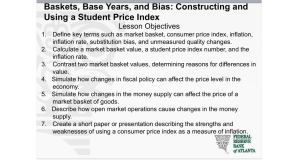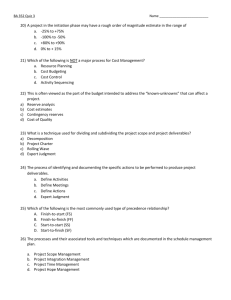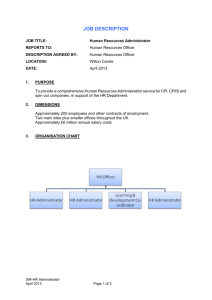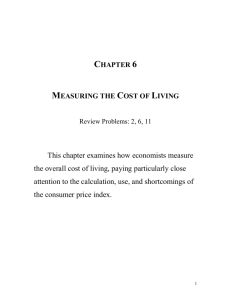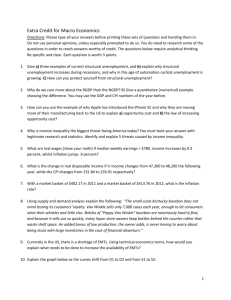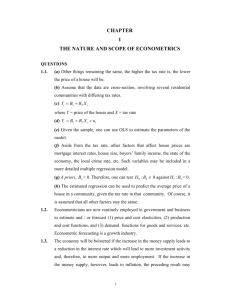CPI
advertisement
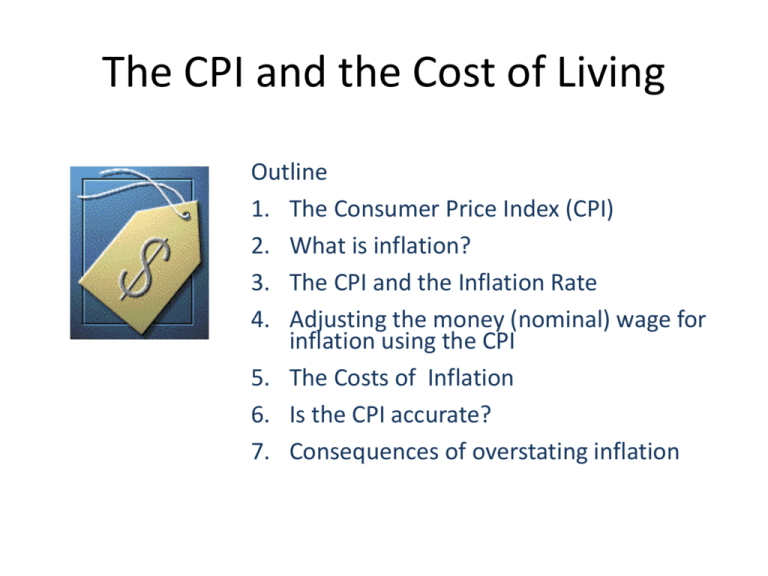
The CPI and the Cost of Living Outline 1. The Consumer Price Index (CPI) 2. What is inflation? 3. The CPI and the Inflation Rate 4. Adjusting the money (nominal) wage for inflation using the CPI 5. The Costs of Inflation 6. Is the CPI accurate? 7. Consequences of overstating inflation The Consumer Price Index (CPI) We use the CPI to measure changes in the cost of living experienced by households. The CPI is the “narrow” price index in that the market basket used to construct it includes items purchased by households. Bureau of Labor Statistics economic assistants check the prices of 80,000 items in 30 metropolitan areas each month. The inflation rate is simply the percentage change in the CPI from one period to the next. 1982-84 is the reference base period THE CONSUMER PRICE INDEX • Calculating the CPI – The CPI calculation has three steps: • Find the cost of the CPI basket at base period prices. • Find the cost of the CPI basket at current period prices. • Calculate the CPI for the base period and the current period. THE CONSUMER PRICE INDEX Table 7.1 shows the consumer price index: a simplified CPI calculation. 7.1 THE CONSUMER PRICE INDEX CPI = Cost of CPI basket at current period prices Cost of CPI basket at base period prices For 2000, the CPI is: $50 x 100 = 100 x 100 = 140 $50 For 2003, the CPI is: $70 $50 x 100 Inflation prices Inflation is a sustained increase in the prices of goods and services (or the cost of living). To measure inflation, we look at changes in the price of a market basket of goods or services households typically purchase with their income Time THE CONSUMER PRICE INDEX • Measuring Inflation – Inflation rate – The percentage change in the price level from one year to the next. Inflation rate = CPI in current year CPI in previous year CPI in previous year Inflation rate = 140 120 120 x 100 = 16.7 percent x 100 The CPI Market Basket The BLS now revises the CPI market basket every 2 years 1960 1965 1970 1975 1980 1985 1990 1995 2000 2005 2007 29.8 31.8 39.8 55.5 86.3 109.3 133.8 153.5 174.5 196.4 211.68 Source: Bureau of Labor Statistics Computing the Inflation Rate for 2007 The CPI was equal to 203.30 in December 2006. In December 2007 it was 211.680. P 2007 211.680 203.30 100 4.12% 203.30 Inflation In Selected Countries U.S. Argentina Australia China Pakistan Turkey 2007 Russia 2006 Euro Area Britain Japan 0 2 4 6 Percent Source: The Economist 8 10 12 The inflation myth Inflation cannot by itself decrease average real income. Inflation can shift purchasing power from some groups to others Inflation in not an equal opportunity villain. That is, inflation arbitrarily, and unfairly, redistributes real purchasing power from some groups to others. The race to stay ahead of inflation •Inflation erodes the purchasing power of income and sets off a race to stay ahead of the cost of living. •Teachers, fireman, truck drivers, nurses, accountants, plumbers, social security recipients, and others strive to increase their incomes so as not to suffer a decrease in their standard of living. •Some groups do better than others. Machinists Job description: Set up and operate a variety of machine tools to produce precision parts and instruments. Mean CPI Year Annual Wage (1982-84 = 100) 1995 $31,270 152.4 2005 $34,790 196.4 Source: Bureau of Labor Statistics Are machinists better off in 2005? Real Wages 1995 Nominal Wages 1995 $31,270 100 100 $20,518 CPI1995 152.4 Nominal Wages 2005 $34,790 Real Wages 2005 100 100 $17,714 CPI 2005 196.4 Why are we smiling? Because our social security benefits are indexed to the CPI Why doesn’t Congress index the minimum wage to the CPI? Value of the Federal Minimum Wage Nominal Real Value Value (1982-84) 1938 $0.25 $1.77 1949 0.40 1.68 1955 0.75 2.80 1961 1.15 3.85 1966 1.25 3.86 1974 2.00 4.06 1978 2.65 4.06 1989 3.35 2.70 1996 4.75 3.03 2006 5.15 2.53 2007 5.85 2.76 2010 7.25 3.32 Year Source: U.S. Department of Labor Unexpected inflation redistributes real income from lenders to borrowers •Repayments schedules for most debt contracts are fixed in nominal or money terms—that is, debts are not indexed to inflation. •Inflation erodes the real value of repayments. Savings & Loan institutions lost money on long term mortgages in the70s and 80s. We bought this house in 1957 for $19,000. We financed the house on a 30 year mortgage note at 3.5 percent interest. Can you guess what our monthly payment was? Answer: $85.32 Sources of Bias in the CPI Some economists have complained that the CPI does not accurately measure changes in the cost-of-living. They cite the following problems •New goods bias •Quality change bias •Commodity substitution bias •Outlet substitution bias New Goods Bias Think of all the stuff you buy today that was not around just 20 years ago •Personal computers and software •Satellite TV •Cell phone service •High-speed internet service •Laser eye surgery •Digital music players •Serotonin reuptake inhibitors Quality Change Bias Many items have undergone qualitative improvements over time. Cars, cameras, and software are three examples •Changes in real income over time are not measured properly. •Private contracts are distorted. •Increase in government outlays
